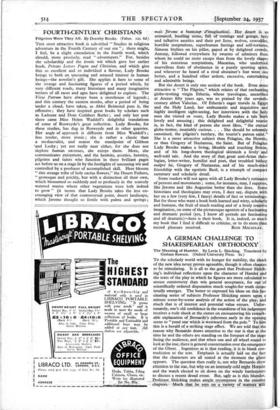FOURTH-CENTURY CHRISTIANS
Pilgrims Were They All. By Dorothy Brooke. (Faber. I2S. 6d.) Tins most attractive book is sub-titled " Studies in religious adventure in the Fourth Century of our era " ; there might, I feel, be a slight emendation in the fourth word, which should, more precisely, read " adventurers." For, besides the scholarship and the ironic wit which gave her earlier book, Private Letters Pagan and Christian, and which give this so excellent and so individual a flavour, Lady Brooke brings to both an unceasing and amused interest in human beings—the novelist's gift. She applies it here to some of the strange and fascinating figures of a period which, by very different roads, many historians and many imaginative writers of all races and ages have delighted to explore. The Vitae Patrum have always been a storehouse of legends ; and this century the eastern monks, after a period of being under a cloud, have taken, as Abbe Bremond puts it, 'the offensive ; they have inspired great books by scholars such as Ladeuze and Dom Cuthbert Butler ; and only last year there came Miss Helen Waddell's delightful translations of some of Rosweyde's great collection. Lady Brooke, for these studies, has dug in Rosweyde and in other quarries. Her angle of approach is different from Miss Waddell's ; less tender, more ironic ; she is rather a classic than a mediaevalist, and nearer the standpoint of Gibbon 'and Lecky ; yet not really near either, for she does not deplore human excesses, she enjoys them. More, she communicates enjoyment, and the hermits, ascetics, heretics, pilgrims and saints who function in these brilliant pages act before us on a stage lit by the footlights of unceasing wit and controlled by a producer of accomplished skill. Here blooms " this strange tribe of holy cactus flowers," the Desert Fathers, " grotesque and prickly, but with a distinction all their own, which blossomed so suddenly and so profusely in the scarcely watered wastes where other vegetations were loth indeed to grow " (it seems that Lady Brooke takes the less en- couraging view of that controversial point, desert landscape, which Jerome thought so fertile with palms and springs ; mars .7erome a heaucoup d'Imagination). Her desert is an animated, bustling scene, full of -comings and goings, holy
and talkative ascetics and their pet lions, wolves, crocodiles, horrible temptations, superhuman fastings and self-tortures, Simeon Stylites on his pillar, gaped at by delighted crowds, Antony, followed everywhere by swarms of admirers from whom he could no more escape than from the lovely shapes of his notorious temptations, Macarius, who undertook marvellous feats of abstinence in a purely sporting spirit, and whenever he heard of a rival abstainer's feat went one better, and a hundred other ardent, excessive, entertaining and admirable beings.
But the desert is only one section of the book. Even more attractive is " The Pilgrim," which relates of that enchanting globe-trotting virgin Etheria, whose travelogue, unearthed at Arezzo fifty years ago, was so praised by the seventh- century abbot Valerius. Of Etheria's eager travels in Egypt
and the Holy Land, her enthusiastic and inquisitive and highly intelligent sight-seeing, her interviews with the hOly men she visited en route, Lady Brooke makes a tale both lovely and amusing ; this delighted and delightful tourist is, in fact, the kind of person she most likes, " the eternal globe-trotter, insatiably curious. . . . She should be solemnly canonised, the pilgrim's tutelary, the tourist's patron saint." She is a more attractive subject than. Pelagius, the Heretic, or than Gregory of Nazianzus, the Saint. But of Pelagius Lady Brooke makes a living, likeable and touching Briton, and of his long-drawn theological skirmish a lively' and well-told tale. And the story ,of that, great anti-Arian theo- logian, letter-writer, homilist and poet, that troubled bishop malgri lui, Gregory of Nazianzus, and of his much-tried friendship with the egotistic Basil, is a triumph of compact summary and scholarly detail.
Some readers will not agree with all Lady Brooke's estimates of persons and movements ; some, for instance, may, I suppose, like Jerome and like Augustine better than she does. Some historians and theologians may even, I dare say, dispute with her on a few (very few, I fancy) details of fact or terminology. But for those who want a book both learned and witty, scholarly and humane, the fruit of much reading and of a lively creative imagination, on some of the picturesque agonists of a fascinating and dramatic period (yes, I know all periods are fascinating and all dramatic)—here is their book, It is, indeed, so much my book that I find it difficult to criticise, or to do more than


















































 Previous page
Previous page